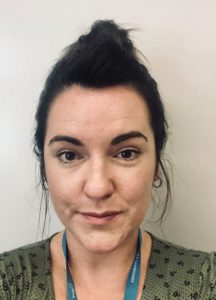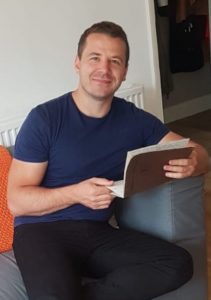From left to right: Robin Brabham, Tessa Keenan and Martin Fascione
Introducing the researchers:
Martin Fascione received his Ph.D. from the University of Leeds in 2009, working with W. Bruce Turnbull on synthetic carbohydrate chemistry. Following a Marie Curie fellowship with Prof. Steve Withers, FRS, in Vancouver and Prof. Gideon Davies, FRS, at the University of York (2012-2014), he took up a lectureship within Chemistry at York in August 2014. His research interests include the chemical glycobiology of rare sugars, synthetic carbohydrate chemistry, and the chemical/enzymatic modification of proteins.
Robin Brabham completed his PhD studies in the Fascione group in 2020. His thesis explored the use of amber stop codon suppression as part of new methods for the incorporation of reactive aldehydes into proteins for bioconjugations.
Tessa Keenan received her PhD in 2017 from the University of York on protein O-mannosylation. Since completing her PhD, she has undertaken postdoctoral training in the Fascione group in the areas of chemical glycobiology and protein bioconjugation.
What inspired your research in this area?
We recently developed an exciting method for modifying proteins (Chem. Sci., 2018, 9, 5585-5593), using reactive a-oxo aldehydes in proteins, but a challenge of this work was extending it to any position within the protein. Periodate oxidation of vicinal diols, or amino alcohols has long been a common method to generate aldehydes in sugar and protein chemistry, it therefore seemed an obvious next step to incorporate such a motif into an unnatural amino acid.
What do you personally feel is the most interesting outcome of your study?
The ability to incorporate the a-oxo aldehyde internally within proteins is potentially very powerful for future bioconjugation studies. However, the most interesting outcome of the paper is arguably the realisation that the classical unmasking of aldehydes by sodium periodate oxidation is hindered in PBS, a very common buffer for handling proteins.
What directions are you planning to take with your research in future?
Our primary focus is the study sugars at the interface between chemistry and biology, with an emphasis on understanding the roles they play in disease and using this knowledge to develop innovative new therapeutics. To achieve this goal we have been developing new methods for synthesising sugars and modifying proteins using aldehyde handles, and are currently using this toolkit to address unanswered questions in a wide range of diseases, including prostate cancer and leishmaniasis.
Read the full article: Rapid sodium periodate cleavage of an unnatural amino acid enables unmasking of a highly reactive α-oxo aldehyde for protein bioconjugation
See the other articles showcased in this month’s Editor’s Collection













